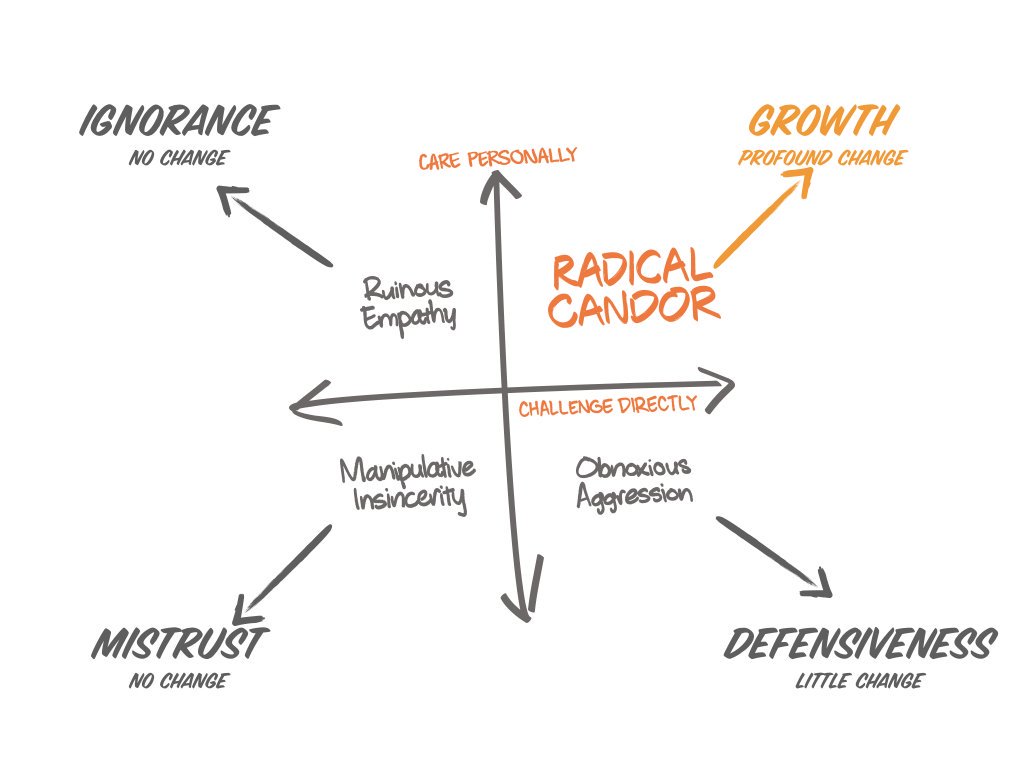Your cart is currently empty!
Radical candor for leadership development and coaching
By
.

Radical candor for leadership development and coaching
Relatively early in my leadership career, I discovered an earlier version of Kim Scott’s talk on delivering feedback to employees using Radical Candor. As a leader, and now a leadership development coach, I have consistently strived to leverage this framework and way of working teaching it to multiple groups. Full disclosure, most of my career has been based in the midwest, though I’ve worked with global teams and individuals. I mention this, as I do believe my experience could be skewed as a British transplant to the state of Minnesota – know for both it’s kindness, and lack of direct communication. Even for the Brits though, I would say I tend to lean on the side of direct communication.
I had to learn throughout my early career on how to reign in the candor a wee bit and say what I was thinking without seeming aggressive to folks around me. And I truly was a bit aggressive – not only the heavily gendered “overly assertive” (which I also experienced plenty). Scott’s framework of Radical Candor gave me a path to balance communicating in a way that was true to my value of authenticity while balancing kindness. I also observed many team conflicts, individuals struggling to interpret feedback from superiors and inevitably people saying one thing and doing another – all aspects of the framework below.
As a leader, feedback is not only an imperative, it is a duty and privilege that you provide your employees. High performing cultures are made up of high performing individuals, and it is your responsibility to support the growth and development of your team.

Building upon a foundation of trust
In order for Radical Candor to be an avenue of clear communication that is truly helpful for your team and partners, you must have invested in a foundation of trust. You must demonstrate a genuine care for the success of the individual, that is not self-serving or it becomes manipulative. Consider your employee’s past experiences with bosses, as that may mean they need more space and time to be assured that your intentions are genuine. Sometimes you have to rumble through some tough feedback and maintain kindness and support, and be in their court before you can truly unlock shared Radical Candor.
Weaponization of Radical Candor
Unfortunately, being a popular framework has led to some weaponization of the term “Radical Candor”. I’ve heard leaders who provide harsh and unconstructive feedback say the likes of “What? I’m just being Radically Candid with you.” and even claim the employee lacks “resilience” if they struggle with the feedback or get defensive. This is firmly in the lower right quadrant of Scott’s framework, regardless of how the leader is communicating. It’s unfortunate but not surprising that folks who hang out in that quadrant have a hard time grasping geniune “caring personally.” If you have a leader like this, I’m sorry – you are part of the dealing-with-a-terrible-boss club.
Coaching Prompts for Teams
In my teaching and utilization of the framework, especially in cultures who struggle with communication, I focus on introspection of the experience of not receiving Radically Candid feedback and it’s consequential negative impacts on people. Ask yourself or your teams the below questions after watching Scott’s talk, for a vibrant discussion on this topic.
Think of a time you discovered someone was not Radically Candid with you? What happened?
Think of a time you were not Radically Candid with someone else? What happened?
What has been the most positively impactful feedback you ever received from a superior? Reflect on how it was delivered – what was effective?
What has been the most negatively impactful feedback you ever received from a superior? Reflect on how it was delivered – what caused the negative impact?
Best of luck! I’d love to hear if you use these prompts with your teams and the dialog it opens up.
